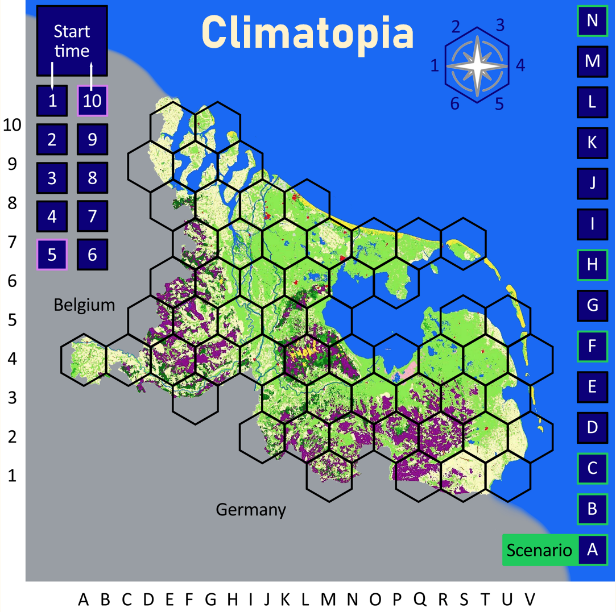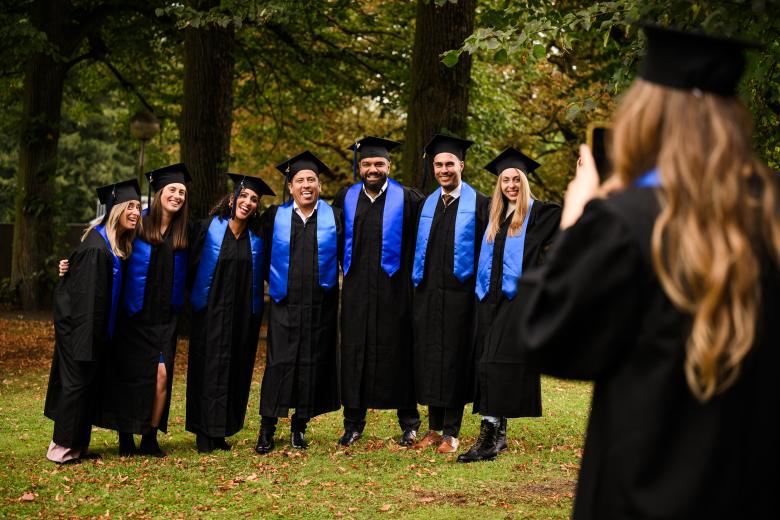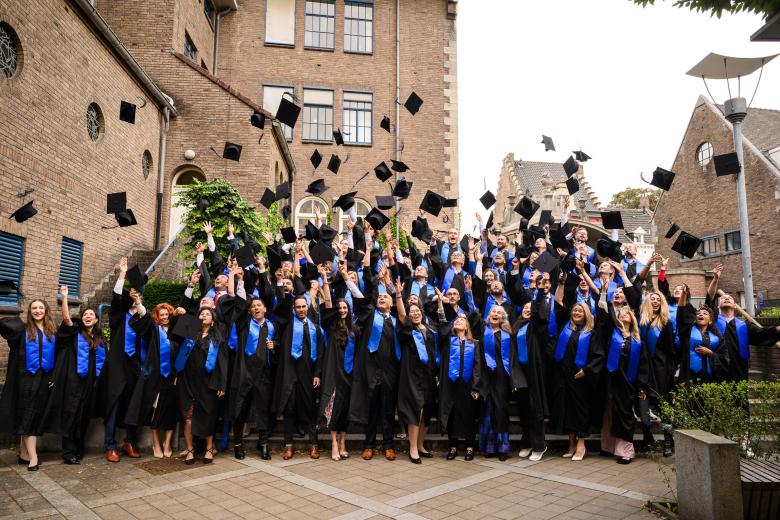The Maastricht Immersive Learning Lab – learn to play; play to learn!
What if students could use play to learn to think strategically, apply economic concepts and deal with complex problems? This is what we have started exploring in the first of a series of three pilots of the Maastricht Immersive Learning Lab.
What is the MILL?
The MILL is:
Maastricht: a joint initiative from different departments of SBE (MILE, ERD, Finance, MSI), with support from MORSE, to use serious games as a learning tool.
Immersive: Learners are immersed and trained and make decisions in a real time environment to increase/enforce engagement in learning.
Learning: The learning environment is designed and managed to ensure that pre-defined learning goals are achieved.
Lab: The environment is controlled, and decisions are recorded. The environment can thus be manipulated to ensure that learning goals are achieved but also allows observers to study team or individual decision-making processes in controlled conditions.
3 pilots are tested in 2024 in a variety of environments and with a variety of target audiences:
Pilots 1 and 2 are embedded in an educational setting at the School of Business and Economics, involving a small group of master students of the MSc Economics and MSc Economics and Strategy in Emerging Markets (pilot 1) or a large group of first year students (pilot 2). They play and learn about climate and health crises in a cooperative boardgame, embodying different stakeholders and identifying the trade-offs between individual and collective objectives (pilot 1); or compete against each other to maximize profits, demonstrating their understanding of financial concepts and markets (pilot 2).
Pilot 3 will involve practitioners from the Limburg region. The game will bring awareness and understanding about a variety of scenarios and shocks (which can be for example demographic, economic, ecological, technological ...) and will force the participants to strategize and anticipate new ways of thinking and acting regarding uncertainty about such shocks and scenarios.
More information about the MILL and its developments are shared on the MILL webpage.
In what follows we describe why we believe that serious games should be added to the portfolio of learning tools available to educators at UM and beyond, how we have implemented it so far and how it has been received by students of Pilot 1, and what we can expect in the future from this new initiative.
Why use games for education?
Games as “safe” reality.
Like other educational tools such as case studies or projects, games offer a safe and controlled environment for students to learn about reality and apply theoretical concepts. Yet, different from the real world, they are simpler and can isolate specific components to enhance learning; and more importantly, if students make mistakes, there are no negative consequences. They can also repeat the experience and use the game as a controlled laboratory, or compare outcomes between teams - why did this group succeed and not the other one? Which strategies paid out and which failed?
Beyond critical thinking: a dynamic feedback environment.
However, if a case is useful to learn about a specific historical example, the advantage of a game is that it is set in a dynamic feedback environment. Students need to think critically, not only to write a report, but to decide what to do – and these actions obtain direct responses from the environment (i.e. the other players, or the game itself). In addition, the environment itself can change during the game: new events or rules can be introduced, requiring adaptability and fast response.
Games to understand the complexity of the real world and the variety of perspectives.
Even though they are a simplification of reality, games in which players embody different roles force them to see the different perspectives and interests active in a situation and realize why some stakeholders would behave as they do in reality.
Games to enhance creativity.
At the same time, within the clarity of the rules of the games, discussion among players may lead to the emergence of new solutions and behaviors to solve the problem at hand. As described by Duke and Geurts (2004):
“[Games help to develop new knowledge because they allow participants to experiment with behavior and strategies never tested before. ]”
Games are fun!
Lessons from Delft
How can we do this in practice? As for any academic topic, we start by learning from others. The documented experience at the University of Delft (Warmelink et al., 2013) provides important insights.
The 4 uses of games in education:
Games can be used 1) at beginning of courses to sensitize students to a new problem or concept; 2) to explore the different dimensions of a problem; 3) to practice and apply theories and skills; 4) to assess students.
Games can take various formats (with different costs)
1. Analogue games (no computers but cards, maps, boards, dice and chips and face-to-face communication)
2. Computer-supported or computer-based games (the computer either provides a platform for the play either to compute difficult tasks or to present an environment supporting players’ decisions; or represents the platform in which players interact themselves)
In the MILL so far, we are experimenting with analogue games. Our first pilot is a boardgame, and our second pilot is a card game. This reduces costs (both for design and development time) and allows us to get rapid results to further improve our concepts.
Games should be embedded in a portfolio of educational activities
As described above, games have different purposes within a curriculum, and this also means that the introduction of serious games in education should complement existing educational tools, and work together to either motivate students’ curiosity in a topic (sensitizing games), to help clarifying and applying academic concepts to concrete cases (exploring and practicing games) or to conclude a course and bring together the different elements and learning objectives (games for assessment). This is confirmed by Warmelink et al., (2013) who introduced the long list of games they created and played at Delft with the following statement:
“In our view, to foster this learning a game is not, and never should be, an isolated educational method. Lectures and other course methods and material are needed to assist students move through Kolb's other stages; most notably reflection on the experience and formulation of a subsequent theory.”
Pilot 1: Climatopia and Pandemia
The first pilot was implemented in a new course offered to MSc Economics and MSc Economics and Strategy in Emerging Markets students called “Case studies of Sustainability problems”. Two games, the first one illustrating a climate crisis (Climatopia), and the second one a health crisis (Pandemia), mirror other sessions on the same topics during the course (a first session with discussions based on academic literature and case studies, and another session using data analysis).
Indeed, using the insights from previous research, the development of the game has been guided by a set of principles:
The game should help students apply the concepts of the course (exploring role). This means that it should be easy to link the game to the previous session presenting case studies and related literature on floods or on the COVID-19 pandemic, respectively.
The game adds new knowledge by allowing students to understand the trade-offs and strategies of a variety of stakeholders (government, citizens, private sector…) in a climate or health crisis
The game gives space for students to be creative, to discuss and to negotiate (rules define the basic set-up for interactions, but collective decisions require discussions)
The game is embedded in the course (it is combined with the other activities in a clear way and limited to one tutorial session)
What did we come up with?

This simulation game has players compete for resources in Climatopia to grow the economy while managing (the effects of) climate change. The purpose of the game is to complete all missions and collect as many end score points as possible.
4 players (a Government, a representative of Citizens, of the Primary sector energy and food production and the Industry sector) must grow the economy and their role specific counter (well being or profits) while dealing collectively with the destructive impacts of climate events.
All players lose the game when the joint missions are not completed If all missions are fulfilled when the story reaches the end of the story track, the player with the highest score on the character counter wins the game.
What did we learn?
The best way to illustrate what the game achieved is simply to see it from the point of view of the students themselves (later we will analyse the end-course survey and invite the students to participate to a focus group as well).
What was our goal for this game?
“The overarching objective of this simulation was to provide participants with an immersive experience, allowing them to navigate the intricate web of conflicting interests among stakeholders in the face of climate change. The primary focus was on finding a delicate balance in relationships between stakeholders to effectively address the challenges posed by climate change.” (Zhuxin)
What have you learned?
“We understood probably more what means a systemic crisis and how all different stakeholders are all connected. I think it also highlights how important coordination is. Maybe this game also shows that we are not so well prepared: for me, natural catastrophes are always far from my experience.” (Sybille)
How did you learn?
“The discussions revolved around trying to create “treaties” or agreements between stakeholders to maximize efficiency. While this may not have been the main goal of the game, I found it to be very useful and make the scenario feel much more “real-life”” (Emily).
“It was a fun way of looking at a model of how we treat climate change in the real world”. (Floor);
In conclusion:
“Overall, as an exchange student, I am delighted to participate in such a game. This is my first time playing a role-playing game like this, allowing me to immerse myself in the efforts that Europe is making in environmental protection. The game has also made me realize the challenges of balancing economic development with environmental protection. I also hope to have the opportunity in the future to play different stakeholders in this game.” (Zhuxin)
“It was interesting to see how the interaction between stakeholders could affect the development of the game in a positive way or in a negative way. Also, the linkages between climate change, decision-making and cooperation within a community were well-prepared and effective.” (Vittoria)
What I really appreciate was the creativity of the game and how you tried to add some macroeconomics events. By the end, I thought it was instructive and, in the meantime, pleasant. (Sybille)
What is next?
We will post updates about the evaluation of Pilot 1 and the implementation of Pilots 2 and 3 on the MILL webpage, and plan to develop MILL through new initiatives (within education or outside) in the future as well.
We hope we have convinced you about the versatility, effectiveness and entertaining features of serious games, and inspired you to consider them as an integrative part of the portfolio of educative tools as well!
References
Duke, R. D., & Geurts, J. (2004). Policy games for strategic management. Rozenberg Publishers.
Warmelink, HJG., Bekebrede, G., Harteveld, C., Mayer, IS. & Meijer, SA., (2013), “Lessons learnt from a decade of game development for higher education in Delft”, in Games, simulations and role-play; transforming teaching into learning in higher education. Nygaard, C., Courtney, N. & Leigh, E. (eds.). Faringdon: Libri Publishing, p. 171-188 18 p.
Also read
-
Maastricht University recognised among top institutions in CEO Magazine’s 2025 Green MBA Rankings
We are proud to share that Maastricht University School of Business and Economics has been recognised as a top-ranked institution in the CEO Magazine 2025 Green MBA Rankings.

-
Global recognition for SBE’s Executive Education by Financial Times
We are proud to announce that Maastricht University School of Business and Economics (SBE) has secured an impressive global ranking of 84th in the Financial Times Open-Enrolment Executive Education Ranking 2025.

-
SBE Researchers Awarded in NWO SGW Open Competition XS
The School of Business and Economics (SBE) at Maastricht University proudly announces that all three research proposals submitted to the latest NWO SGW Open Competition XS have been awarded funding. This exceptional outcome highlights the high calibre of SBE research and its relevance to societal...
